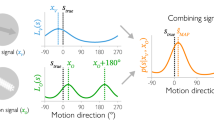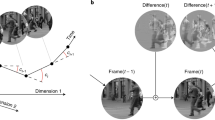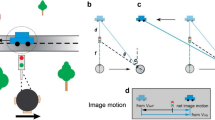Abstract
A difference in speed of rotation, but not a difference in the direction of rotation alone, serves to make an array of line segments in a computer generated movie discernible from the background. The finding outlines some of the limitations of the human visual system.
This is a preview of subscription content, access via your institution
Access options
Subscribe to this journal
Receive 51 print issues and online access
$199.00 per year
only $3.90 per issue
Buy this article
- Purchase on Springer Link
- Instant access to full article PDF
Prices may be subject to local taxes which are calculated during checkout
Similar content being viewed by others
References
Barlow, H. B., and Hill, R. M., Science, 139, 412 (1963).
Hubel, D. H., and Wiesel, T. N., J. Physiol., 148, 574 (1959).
Hubel, D. H., and Wiesel, T. N., J. Physiol., 195, 215 (1968).
Author information
Authors and Affiliations
Rights and permissions
About this article
Cite this article
JULESZ, B., HESSE, R. Inability to Perceive the Direction of Rotation Movement of Line Segments. Nature 225, 243–244 (1970). https://doi.org/10.1038/225243a0
Received:
Revised:
Issue Date:
DOI: https://doi.org/10.1038/225243a0
This article is cited by
-
Aging and the detection of moving objects defined by common fate
Scientific Reports (2022)
Comments
By submitting a comment you agree to abide by our Terms and Community Guidelines. If you find something abusive or that does not comply with our terms or guidelines please flag it as inappropriate.



